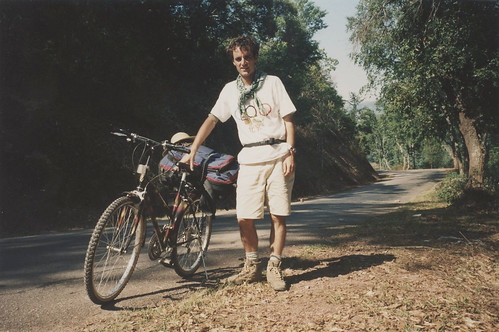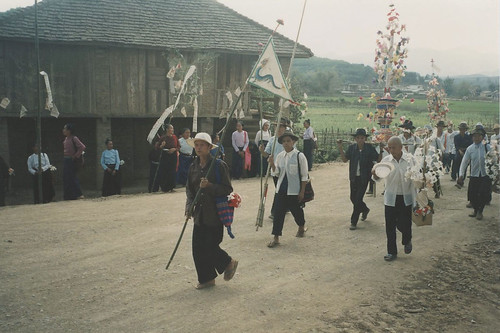
At a small dam, three hours north of Jinghong, an old man waved me over. inviting me for a drink using the thumb-to-mouth Chinese gesture. He was Han Chinese, one of many settlers from the north. 'I never went to school.' he told me as he peeled an orange for me. 'I learnt to read and write in the army. Look!' He proudly showed me the current affairs buck he was reading. 'I was in the army for eight years, in the forties and fifties. We were so optimistic then: Chairman Mao told us we would catch up with Britain within 50 years. But look at us now! Still the same' We will never catch up with Britain, we have too many people!' he said. I left him, to carry on my pedalling up the gut-busting hill, counting every kilometre post, wondering how long I could continue. The road was empty but for an occasional tractor. Insects whined and birds whooped in the surrounding bush,
By lunchtime I had climbed about a thousand metres and reached a plateau. where I collapsed to guzzle lychee juice at a lonely roadside kiosk. I talked with a friendly man, sat on a stool outside. 'From England, eh?' he said. 'How about London? Is it warm like here? We call London 'Fog City', you know. In the old days we used to send a lot of our tea to London from here. Down the road there, through Daluo to Mandalay and on to England. Pu-er tea.' I told him I had heard of it. 'Yes, very famous tea, grown around here. You can get five refills from one lot of tealeaf. Other teas only give about three cups before they lose their flavour.'
'What's Burma like now?' I asked him. 'Ah! You don't want to go there. Too poor. The people have nothing to eat, they come over here looking for work, ' he said. 'China is richer than Burma. he continued, 'We are more stable, and that's what's important, don't you think? In Burma it is very dangerous, all the heroin business. Very bad. And bandits - they have guns and they won't hesitate to shoot you - like New York! They're bad eggs and you don't want to bump into them. believe me,' he said. I thought he was the shopkeeper, but as we gut up to leave I noticed a holstered pistol hanging at his waist. 'Well, be seeing you, take care!' he said cheerily, and walked over to a sleek Toyota Lexus I had not noticed, parked under a tree. It had Gonganju number plates.

By nightfall I reached a small town called Mengzhe. It was nothing hut a street of empty shops and a couple of gritty restaurants. There was nothing to see except a small temple where young monks copied Thai characters into cheap exercise books and sat around watching Hong Kong kung-fu videos. The only place to stay was a dirty guesthouse, with a mini-sawmill operating in its courtyard, screeching until 11pm. I felt depressed and tired, and couldn't face (he prospect of more (.lays on the road like this. On my second day on the road, I continued the uphill cycling for a few more hours. The road was quiet and there was no shops en route. The few peasants I came across picking at the dry soil were not the friendly Dais, but upland Hani and Lahu minorities, who wore towel turbans. There were also some 'Hui' minority muslim men wearing proletarian flat caps.
The final straw that made me abort my Dali trip was when my water supply ran out in the middle of nowhere. I decided instead to visit the nearby border town of Daluo, a day's cycle down a branch road to the south. Thus it was with a sense of relief that I turned my hike around in the middle of the forest and freewheeled back down the road towards Menghai,
My mood improved just as Dai girls appeared by the roadside with buckets of water to drench passers-by like myself. The water-splashing festival had begun. Menghun: There was nothing quite like the blackness of a Chinese village after dark. Menghun was typical: when night fell there was no mains electricity, and the only light was a few glimmers emerging from paraffin-lit shacks, and the firefly-like glow of cigarettes bobbing down the darkened road. Treading warily down the blackness of the main street, I could sense rather than see the other bodies around me.
In villages like these there were only two forms of entertainment at night: Hong Kong videos and karaoke parlours. In Menghun, half-way down the track to the Burmese border town of Daluo, these were the only places with generators: the church-like video hall with its rows of scuffed pews, and the plastic finery of the open-fronted karaoke bars. I spent the evening huddled in a restaurant, drinking warm beer and eating fried peanuts by candlelight. The two sounds of a night-time Chinese village kept me awake under the mosquito net: an echoing girl's voice trying to imitate a Taiwanese songstress, and the crackly oofs and thuds of the amplified kung fu from the video hall.

Awoken the next morning by the sound of tractors revving up, I went through the usual morning rituals of a Chinese guesthouse. First I had to avoid the tethered dog and the sleeping pig and the chooks underfoot, to clamber over rubble in the yard below to a loo full of mosquitoes and bluebottles, and piss someone else's und Further down the concrete slope. Back in the hotel room. the enamel washbowl doubled for brushing of teeth and scrubbing my face with the wet cloth, Chinese-style. (The Chinese, on account of their flat noses, scrub their faces side-to-side. I once had a Chinese man watch perplexed, as I scrubbed up and down either side of my big foreign nose).
The only breakfast available in these country towns was a bowl of noodles enriched with scraps of fatty pork, eaten at a table in the street, to the accompaniment of slurps from fellow diners. Then I waited with baited breath for my first 'Allo!' of the day as I hit the road to Daluo. The road was busy on account of the border trade. On Chinese roads there were basically tour types of vehicle:
1) The 'tuolaji' tractors. These two-stroke wonders usually had a trailer full of locals waving and grinning at me. The belt-driven engine could also be adapted to operate a mini-sawmill, or a field rotovator.
2) The 'Jiefang' (Liberation) truck. These tough, squared-edged 1970 style wagons were often loaded to bursting point with coal or metal bars. They came in a choice of two colours: light green or blue, and there was a primitive canvas canopy version that was the mainstay for transporting consumer goodies such as Pabst Blue Ribbon beer and VCRs around the country.
3) Cop cars. These came in all shapes and sizes, from Mitsubishi Pajero 4WDs and Toyota Crowns (black windows fitted as standard), down to the more basic Chinese Army jeep. It was difficult to tell when police cars were 'on duty', since they often had mum and the kids on board too.
4) Buses. The obsolete old hattlewagons were slowly being superceded by smaller minibuses and Chinese copies of Suzuki microvans.
Most buses carried a photo of Chairman Mao as a kind of St Christopher, to ward off accidents. The road to Daluo was under repair, turning the whole 50km into a dusty switchback trail through the jungle.
I soon gave up the struggle on my hike and hitched a lift on the back of a Jiefang truck. I hopped off for the last 15km into Daluo, which was a graceful ride through hushed groves of rubber trees. The people were friendly again, school kids waving as they dug ditches at the side of the road. And I was welcomed on the outskirts of Daluo by a reception party of white-uniformed police and Dai women wearing sashes, giving out apples from a silver tray. Apparently there was a government conference on in town to celebrate the opening of their new 'Business Enterprise Zone'.
I had expected to find another sleepy border village, but Daluo was a booming business town with a duty-free air of a major international frontier. Huge advertising hoardings invited visitors to the International Trade Hall, and there were half-finished mirror-glass office complexes and plush hotels. In the not-too-distant future, it would be possible to drive up a highway from Singapore, Malaysia and Thailand up into the Chinese hinterland. With rising excitement I pedalled down 10 the river, which my map showed as marking the border. There was an abandoned checkpoint tower and a row of stalls selling Buddhist deity trinkets.
"Is this the border?' I asked one of the stallholders. 'No. Carry on three kilometres down the road,' he said, pointing across the plain to a distant clump of new buildings. Gerald was right, they had shifted the border. On the newly-sealed road, local hill tribes were walking hack and forth carrying sacks held by straps over their foreheads. Chipped out Indian vans and brand new Isuzu utes had strange Burmese squiggles for number plates. The occupants were dark-skinned, Indian-looking people wearing baseball caps and cheap sunglasses. The border itself was a disappointment: a 'China Gateway Bridge' and a dirt-track leading round a corner. No sign of Burmese police or villages. Just trees. The Chinese border guards eyed me up warily as the traffic built up wanting to cross into Burma. I shrugged my shoulders and followed a UN Relief Agency Jeep back into Daluo.
No comments:
Post a Comment